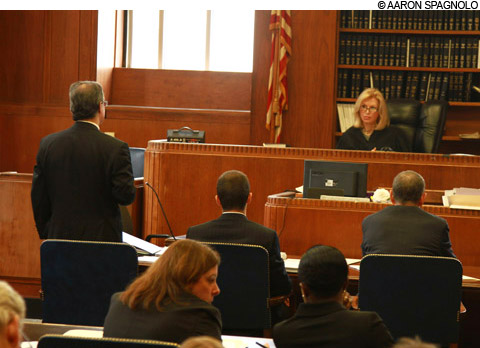
SUFFOLK SUPERIOR Court Judge Frances McIntyre’s ruling could help decide whether Occupy will continue to be defined by its camps, or transition beyond them. |
Occupy Boston and the City of Boston face each other in state superior court next week, for a hearing on the city's right to remove the protesters' encampment on Dewey Square. It's an intriguing confrontation, not least because it pits a leaderless, horizontally structured organization against the closest America offers to fully vertical one-man-rule.That one man is Mayor Tom Menino, whose administration appears to be inching closer and closer to pulling the plug on the round-the-clock protest that began on September 30.
Menino believes that he has the right to remove the protesters, as soon as he determines that public health and safety require it. He also believes, as city attorneys argued in court, that he can order their removal without warning, and without court approval. (In fact, they argue that secrecy is necessary to ensure an effective and orderly eviction.)
The American Civil Liberties Union (ACLU) and National Lawyers Guild (NLG), with the authorization of the Occupy Boston general assembly, have petitioned to stop him. A judge granted a temporary injunction, protecting the encampment through late next week.
A mediation session between city officials and three protesters designated to represent Occupy Boston failed to reach any agreement. So the judge has scheduled a hearing for next Thursday — and his resulting decision will likely be appealed.
The ultimate ruling will likely answer a fairly narrow legal question, and will have no direct effect on encampments facing potential eviction in dozens of other cities.
But to a great extent, it could also decide the long-term nature of the national Occupy movement — whether it will continue to be defined by the encampments, or transition beyond them.
City officials in Boston and beyond appear to want that transition to take place — in the near future, before winter fully sets in.
The protesters, however, are clearly in no rush to make that transition — and nobody, at this point, doubts their willingness to maintain the occupation for the long term. In Boston, they have already ridden out an early snowstorm, and have begun procuring what they need to winterize the Dewey Square encampment. There appears to be no shortage of hardy souls ready to rough it out.
Menino has barred the protesters from bringing winterization equipment into Dewey Square. Winterized structures, with heat generators, are fire hazards; nobody, the city argues, protester or otherwise, may simply construct such facilities where they please, without authorization or licensed oversight.
"We believe it is not in the best interests of health and safety," says Menino press secretary Dot Joyce. "It could catch on fire and kill them."
Of course, without winterization, the freezing conditions will soon become a public-safety issue requiring Menino to act. The die appears to be cast: without a court order protecting Occupy Boston, the city will soon shut it down either because it has been winterized, or because it hasn't.
IS THE MEDIUM THE MESSAGE?
To prevent this from happening, the movement is seeking a restraining order preventing Boston from removing the protesters from Dewey Square. The nearest legal campsite they could occupy is on the Harbor Islands, which they argue is too far removed from the public eye.